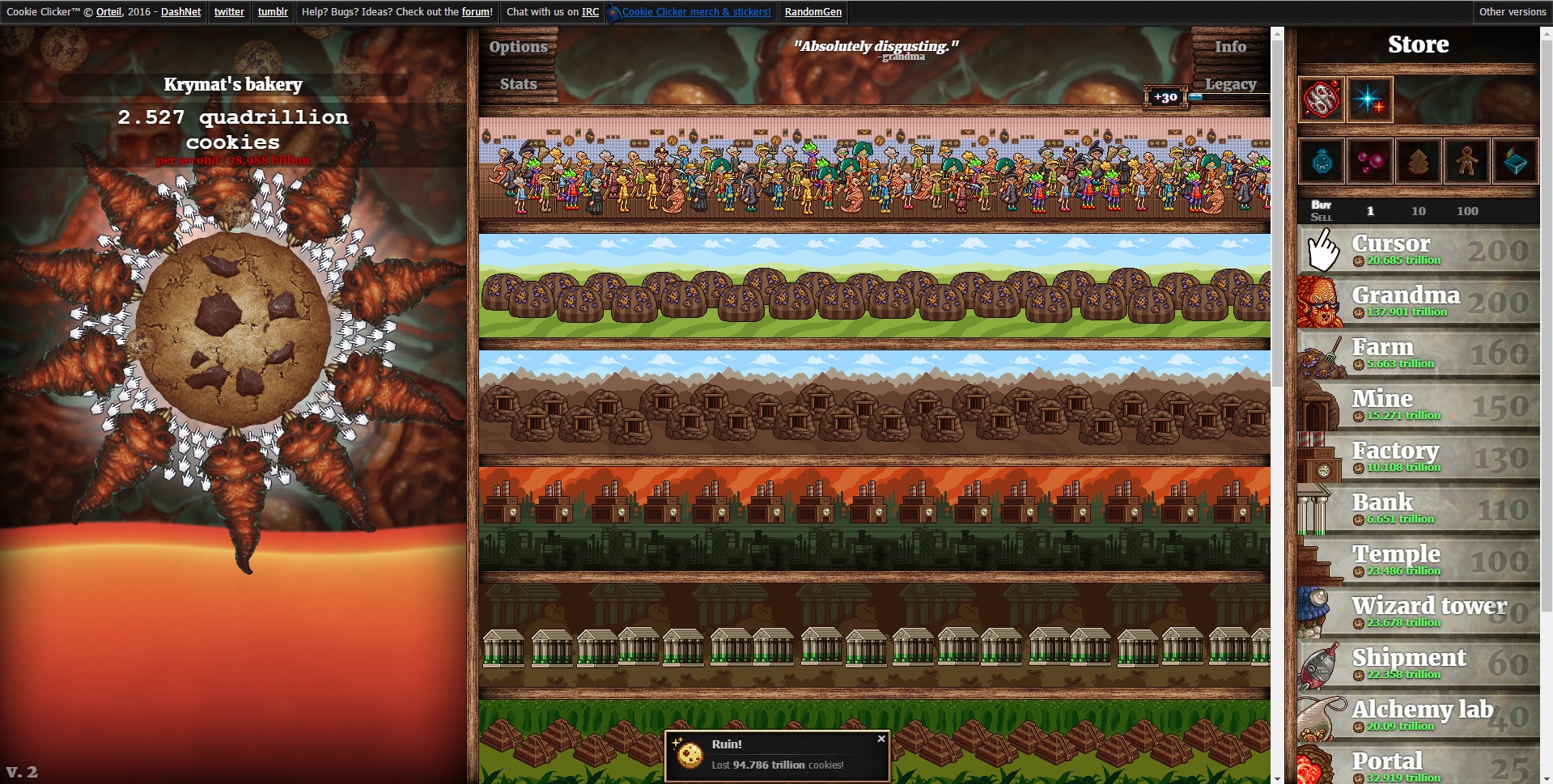“Use neuro-resonant frequencies to influence consumer behaviour”
I can’t tell you exactly how long I’d been clicking away at Frank Lantz’s browser-based stationery synthesis simulator Universal Paperclips when this box popped up. What had begun as a fairly benign experience suddenly went all Skynet, offering a hint of something infinity+1 more sinister than the minimalist monochrome aesthetic had prepared me for. I can’t say how long I’d been clicking, clicking, endlessly clicking away for, because, despite the apparent mundanity of the whole thing, I was already hooked.
Soon, time had been filed away under ‘things that used to matter but now seem pretty arbitrary’, along with food, sleep, and showering. As I continued my mouse mashing onslaught, slavishly anticipating another of Universal Paperclip‘s multipliers, a single, pervasive question echoed through my head, only to be drowned out by the incessant firing of my instant gratification seeking gamer synapses. Why. Am. I. Still. Making. Paperclips?
Stationery Universe
I clearly wasn’t deep enough into the hard-drive-housed spirit of things: The hypothetical AI in the thought experiment Lantz’s game is based on wouldn’t have asked this question. Our future robot overlords are nothing if not singularly dedicated. In his paper exploring the potential ethical dangers of AI production, Philosopher Nick Bostrom imagined:
‘A superintelligence whose top goal is the manufacturing of paperclips, with the consequence that it starts transforming first all of earth and then increasing portions of space into paperclip manufacturing facilities’
Lantz’s game takes this idea to its apocalyptic conclusion, placing you in the role of the AI. Needless to say, things get intense quickly.
So, the game keeps getting stranger, and I keep clicking. Soon, I don’t have to click at all anymore. I get a few upgrades and just sit, watching the numbers go up. Why am I still making paperclips? I ask myself, again. Because I want to know what happens next. That’s my excuse and I’m sticking to it. But I know exactly what’s going to happen next. I am going to make more paperclips.
It was at this point that I released the Hypnodrones. Earth was drained of resources, so I took to the cosmos. FYI: It turns out the cosmos is a fairly robust source of paperclips.
The Rise of Idle Games
So-called ‘idle games’ like Paperclips exist in a contradictory space where they are both intangible time leeches and concrete representations of effortless progression. Engaging with them, we are freed from the anxieties of agency. The only demand they make of us is that we show up occasionally to witness their autonomous accumulation of abstract value. Wait, so you’re telling me I get to win, and I get to use the time I would have spent playing on something else? I tried to tell my brain that win states are inherently meaningless without the internalised experience of overcoming challenge that defines play in its most basic form. My brain told me to shut up and make more paperclips.

They occupy this paradoxical place in culture, too. In his GDC talk ‘The Mechanics and Monetisation of Self Playing Games’, Kongregate‘s Anthony Pecorella describes them as ‘almost a genre that doesn’t want to exist’. Although, if you watch the rest of the talk, you’ll notice this doesn’t stop him giving a room full of attendees advice on how tobest extract money from people via these self destructive non-games. But it’s a fair point, well made. The genre’s 2002 progenitor, Progress Quest, is effectively just one extremely long joke at the expense of RPG character growth. As someone who feels TL:DR’s are a Fahrenheit 451-level assault on nuance, I still feel like saving you the trouble, so here’s the TL:DP for Progress Quest; RPG mechanics are kind of a waste of time, right? You start up the game. You engage. Congratulations. You’re in on the joke. Here’s the thing though; as Ian Bogost, the author and game designer who also happened to make the Farmville parody Cow Clicker discovered to his befuddlement, ironic engagement is still engagement.
[Live Update: I booted up Progress Quest in my browser for, uh, research purposes and now I can’t bring myself to kill the tab. I am currently ‘Executing a Billy Goat.’]
In 2010, Preparing to play the part of the prosecution in an NY University talk entitled ‘Social Games on Trial’ Bogost ‘realized that the theory alone might not help clarify social games…I decided to make an example…distill the social game genre down to its essence’. The result? ‘easily the most successful game I have ever produced’ says Bogost in his latest book, Play Anything. After a series of updates, including one where Bogost used his nefarious bovine influence for good, allowing players to donate real cows to impoverished countries via Oxfam, he eventually grew bored, initiating Armoogeddon through an AR treasure hunt. ‘Others continued working in that playground even after I abandoned it’ Bogost says. One of those others was Julien ‘Ortiel’ Thiennot with 2013’s Cookie Clicker.
‘Orteil had discovered the logical conclusion of Cow Clicker…a game you didn’t even have to play’ – Bogost
Today, you don’t even have to not-play idle games if you don’t not-want to. Twitch streams, Let’s Plays, and actual honest-to-Jeebus speedruns exist of just about any notable idle game you can think of. So exactly how many layers of ironic detachment are you on again, bruh?
About this many, actually:
That’s a screenshot from last year’s Streamer, in which you watch a game show you people watching you play games.
First person to stream this wins 10,000 internets and the 2017 Golden Pepe award for meme culture implosion.
I want to make something clear: There’s a pretty fine line between compelling play and mechanics specifically designed to exploit the psychological reactions of players. Lantz’s game is the good kind. I finished Universal Paperclips since I started writing this, and I don’t regret the time I spent with it. It’s an extremely clever, genuinely funny experience, but I did find myself asking: Can manipulative mechanics ever truly act as successful commentary on themselves? When we embrace the target of parody as the vehicle for that parody’s delivery, aren’t we just the subject of our own ironic scorn?
Maybe we could ask the publishers of the seemingly endless stream of monetised freemium idle-games if the revenue from ironic players is worth any less…
Some way into Universal Paperclips, you’ll be exploring space with legions of drones, and you’ll start entering combat. Pretty soon, you’re given the option to name the battles your mindless army of automatons fight in, and build monuments to their dutiful sacrifices. This accumulates glory, which in turn accumulates trust. I was initially baffled to why singularly minded mechanisms would concern themselves over such jingoistic meatbag measures of value. Surely an AI would be uninterested in, or would even actively avoid, sacrifice. Why would the transient, almost poetic quality of something as incorporeal as ‘honour’ have tangible worth to a utilitarian construct?
Early on, in his talk ‘Who Cares if it’s a Game’, designer and theorist Jesper Juul throws up a slide that reads:
“Let’s play a game. Winner = Person making largest transfer to my Paypal account during the talk”
Why would a robotic drone care about honour? The same reason Juul’s self consciously ridiculous proposition has enough truth about it to make the audience snigger. By attaching a intangible reward to sacrifice, that sacrifice is immediately recontextualised as meaningful, as is the reward – without either gaining inherent value. Similarly, by shifting the framework that governs how we perceive value, idle games instill their novel representations of essential emptiness with meaning. They are the gamification of nothingness. Whether it’s cows, cookies, or paperclips, the unornamented mechanical distillation of fun is attractive to the casual audience seeking an engaging distraction, while the self conscious mundanity of these Sisyphean soul suckers remains an attractive proposition to the jaded critic. Ironic or not, engagement is all but guaranteed.
And who need neuro-resonant frequencies and hypnodrones when you have that?
Nic Reuben
Latest posts by Nic Reuben (see all)
- These Horizon Zero Dawn Photographers Find the Soul in the Machines - March 16, 2018
- A Completely Objective Review of An Apolitical Game - February 9, 2018
- This Horizon Zero Dawn Photographer Brings the Post Apocalypse to Life - January 17, 2018


